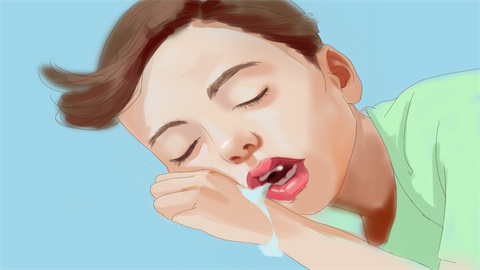Why does saliva have a bad odor?
Generally, bad breath or unpleasant saliva odor may be caused by improper diet, poor oral hygiene, dental caries, gingivitis, or chronic periodontitis. If discomfort occurs, timely medical attention is recommended. Detailed explanations are as follows:

1. Improper Diet
Consuming foods with strong odors, such as garlic, onions, and durian, may cause volatile compounds from these foods to enter the bloodstream during digestion. These compounds reach the lungs through blood circulation and are expelled through respiration; some components may also enter saliva, causing bad breath. It is advisable to reduce consumption of such strongly scented foods. Rinsing the mouth or brushing teeth after eating these foods may help alleviate the odor.
2. Poor Oral Hygiene
Failure to clean the mouth promptly can result in leftover food debris, which bacteria break down. The resulting volatile sulfur compounds and other odor-causing substances produced by bacterial metabolism mix into the saliva, leading to bad breath. One should develop good habits such as proper brushing in the morning and evening, rinsing after meals, using dental floss to clean between teeth, and undergoing regular dental checkups and cleanings to remove plaque and tartar, thus maintaining oral hygiene.
3. Dental Caries
Dental caries are caused by acid erosion and destruction of the hard dental tissues. When food debris remains lodged in cavities, bacteria break it down and produce odor. This may be accompanied by tooth pain and cavity formation. Treatment may involve using medications such as sodium fluoride glycerin paste, ibuprofen sustained-release capsules, and artificial bezoar metronidazole capsules, following medical advice. If necessary, dental fillings should be performed under medical guidance, using filling materials to seal the cavities.
4. Gingivitis
Gingivitis is primarily caused by plaque and tartar irritating the gums. Under inflammatory stimulation, the gum tissue may become prone to bacterial growth, and the byproducts of bacterial breakdown can cause bad odors that mix into the saliva. Patients may also experience symptoms such as gum bleeding and pain. Treatment may involve using hydrogen peroxide solution, metronidazole tablets, amoxicillin capsules, and other medications under a doctor's guidance.
5. Chronic Periodontitis
Chronic periodontitis may result from long-term effects of plaque buildup, food impaction, and other factors. Periodontal tissues are damaged, forming periodontal pockets where large amounts of bacteria, plaque, and food debris accumulate. Bacterial fermentation produces foul odors, which communicate with the mouth via the periodontal pockets, making the saliva odor明显 (notably apparent). Symptoms such as loose teeth and widening gaps between teeth may also appear. Patients may follow medical advice to use medications such as tetracycline tablets, minocycline hydrochloride capsules, and acetylspiramycin tablets for treatment.
Maintaining a balanced diet, eating more vegetables and fruits, increasing dietary fiber intake to promote gastrointestinal motility and digestion is recommended. Avoid smoking and excessive alcohol consumption, as these habits can irritate the oral and digestive systems and increase the risk of bad breath.







